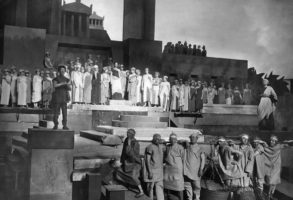
Published January 10, 2019
Claremont Review of Books - Vol. XVIII, Number 3, Summer 2018
Delmore Schwartz, Randall Jarrell, Sylvia Plath, Robert Lowell, and John Berryman, all of whom died more than 40 years ago, remain the most famous American poets born in the 20th century. They are known even more for their tortured, prematurely extinguished lives than for their poetry. For devotees, their lives are the dark consequences of the public’s indifference to poetry. The real reasons for the devastation, however, are more various and complicated than that, involving manic-depression and alcoholism, as well as a poetic tradition that exalts personal torment in the service of high art.
Although American intellectuals prefer to see the ruin of our finest poets as a native problem, caused by our barbaric materialism and want of genuine culture, the story really begins in 19th-century France. The French have a name for doomed poets, and it has become American common currency in speaking of those suffering from madness, drunkenness, drug abuse, or suicide: poète maudit, cursed or damned poet. The coinage was Paul Verlaine’s, whose little book Les Poètes maudits (1888) honored spirits such as Arthur Rimbaud, Tristan Corbière, Stéphane Mallarmé, and Auguste Villiers de l’Isle-Adam. Verlaine (1844–1896) called them cursed, not because they were all moral desperadoes—some were models of decorum in their private lives—but because the obscurity of their verse meant that only a select few would ever read and understand them.
Welcoming Pain
Verlaine’s own life would give maudit the primary meaning it has today. Drunkenness, sexual recklessness, and mad violence were routine for him. He tried to set his wife’s hair on fire, threw his infant son against the wall in response to a cross word from his wife, attacked his mother with a saber when she refused to give him money for drink. He left his wife for the 16-year-old poetic prodigy Arthur Rimbaud. When Rimbaud threatened to leave him, Verlaine shot his lover and wounded him in the wrist. A two-year prison sentence at hard labor redirected Verlaine onto a godly path, and he became a celebrated Catholic poet. The reprobate in him could not be eradicated, however, and a month after his release he returned to Rimbaud and drunken brawling.
Revolted at his backsliding, Verlaine fought for his soul, but none of his efforts at reform was good enough. Verlaine knew himself cursed, and the best he could hope from his shameful existence was to belong to the company of the illustrious poetic heroes. When Verlaine was a young man, the example of Baudelaire (1821–1867) had lured him to pursue poetic glory. Years later, Verlaine’s sonnet “À Charles Baudelaire” (1892) addresses the dead poet who is his brother in sinfulness and in hope of something like solace:
You fell, you prayed, like me, like all
The souls whom hunger and thirst on
the way
Pushed beautiful with hope to reach
Calvary!
—Calvary just and true, Calvary where,
then, these doubts,
Here, there, grimaces, art, weep for
their failures.
Eh? To die simply, we, men of sin.
Hard death on the Cross looks to be the appointed end for the men of sin. The prospect of resurrection is a long way off, reserved for their betters. Fellowship in suffering must suffice for the broken poets’ consolation. Of the last nine years of his life, four were spent in hospitals. He was so comprehensively ravaged by disease that doctors could not single out the cause of death.
Baudelaire was the notorious author of Les Fleurs du mal (The Flowers of Evil, 1857), the poet who found beauty in evil and cursed God for His cruelty toward His trusting children. He was a hashish and opium addict, his existence “damned from the beginning,” as he wrote to his mother in what should have been the prime of his life; dead of syphilis at 46. As Verlaine in his torment claimed spiritual kinship with Baudelaire, so Baudelaire prayed to Edgar Allan Poe as his patron saint. In “Edgar Allan Poe, His Life and Works” (1852), the preface to a collection of Poe’s short stories that he translated, Baudelaire inaugurates two different conceptions of the cursed poet: the man who is destroyed by society’s contempt for his art and his very being, and the one who deliberately and heroically destroys himself—in Poe’s case with alcohol—for his invaluable art’s sake.
To Baudelaire the poet’s suffering at the hands of the philistines is a manifestation of metaphysical injustice: God is ultimately to blame for the devastation of noble writers’ lives. Seen from this angle, Poe is the victim of divine malice responsible for American push, bustle, and crassness: “for Poe the United States were nought but a vast prison in which he ran about with the fevered restlessness of a creature born to breathe the air of a sweeter-scented world—nought but a great, gas-lit Barbary—and that his interior, spiritual life as poet, or even as drunkard, was no more than a perpetual effort to escape the influence of that antipathetic atmosphere.”
Yet the poet’s drunkenness also served his artistic vocation, lubricating memory and imagination: it was very often, Baudelaire wrote,
a mnemonic device, a deliberate method of work, drastic and fatal, no doubt, but suited to his passionate nature. Poe taught himself to drink, just as a careful man of letters makes a deliberate practice of filling his notebooks with notes. He could not resist the desire to return to the marvelous or terrifying visions, the subtle conceptions, which he had encountered in a previous storm…. One part of what delights us today was the cause of his death.
The alcoholic’s bottle here is the instrument of suicidal martyrdom pursued in the hope of artistic immortality.
A life damned from the beginning presented exciting possibilities for a poet built like Baudelaire. He was fortunate to discover that his misfortunes were the characteristic symptoms of the state of creative grace; a revelation which offered assurance that he had been living the life he was made for all along, and effectively demanded that he persist in his now consecrated suffering. Perhaps pain chose Baudelaire from the start, but he came to welcome and to nourish his pain, a gift that only a poet of his type could fully appreciate. To be cursed in this peculiar way was nothing less than beatitude.
Blessed with Madness
Delmore Schwartz (1913–1966), in his 1941 essay “The Isolation of Modern Poetry,” calls Baudelaire “in so many ways…either the first or the typical modern poet.” The modern poet as Schwartz describes him
does feel that he is a stranger, an alien, an outsider; he finds himself without a father or mother, or he is separated from them by the opposition between his values as an artist and their values as respectable members of modern society. This opposition cannot be avoided because not a government subsidy, nor yearly prizes, nor a national academy can disguise the fact that there is no genuine place for the poet in modern life. He has no country, no community, insofar as he is a poet, and his greatest enemy is money, since poetry does not yield him a livelihood.
This lonesome, angry lament comes from the most revered young American poet of that time, whose first book, In Dreams Begin Responsibilities (1938), had been a smash and made Schwartz the culture hero of the day at the age of 25.
His translation of Rimbaud’s Une saison en enfer (A Season in Hell), a canonical text of maudisme, appeared the next year; and in 1943 Schwartz was named poetry editor of Partisan Review, received a Guggenheim Fellowship, and got a job teaching composition at Harvard, where he had been a star graduate student in philosophy. What a lesser being might have considered great good fortune did not placate the precociously embittered young eminence. Simply to be a modern poet was to be cursed. From one side uncaring society leered at him; from another the strain of creation exacerbated his misery. In “The Writing of Edmund Wilson” (1942), Schwartz takes issue with Wilson’s The Wound and the Bow, which attributes creative power to psychic insult and injury: “A further possibility is that the unhappiness and disorder of creative lives is the effect and not the cause of creative effort, which does, after all, tend to make a human being more sensitive, more easily disturbed, and, last but not least, less able to make a living and be a devoted husband and friend.”
In his sublime youthful poems Schwartz sings of the longing for beauty, goodness, justice, wisdom, and love in a world that has scant use for these extravagances. To escape captivity in the importunate body is the earnest young philosopher’s dearest wish, but the poet takes evident pleasure in rendering that prison of the flesh:
The heavy bear who goes with me,
A manifold honey to smear his face,
Clumsy and lumbering here and there,
The central ton of every place,
The hungry beating brutish one
In love with candy, anger, and sleep,
Crazy factotum, disheveling all,
Climbs the building, kicks the football,
Boxes his brother in the hate-ridden city.
In his poetry Schwartz was a golden child; in his disintegrating personal life he became ever more cruel, vindictive, petty, grasping, libidinous, morally ugly. Addiction and mental illness gnawed away at his poetic gift, his sharp intellect, his hope for lasting love and invigorating friendship. In the important biography Delmore Schwartz: The Life of an American Poet (1977), James Atlas movingly relates the gradual but relentless descent from drinking for pleasure to drinking from need. Insomnia bedeviled Schwartz, and his heavy use of sleeping pills from his early twenties helped poison the not exactly innocent drink in his hand. His second wife, the novelist Elizabeth Pollet, wrote that these “dangerous necessities” drove her out of their marriage. “He was a sick man, and more and more a frightened one.”
But a frightening one as well. Schwartz’s most famous bon mot—“Even paranoids have real enemies”—may be true in general but it is also bughouse paranoid in his particular case. His real enemy was his deteriorating mind. Atlas sadly relates the tale of Schwartz’s free-fall into madness, and Saul Bellow captures it superbly, as fiction, with sorrowing zest, in his novel Humboldt’s Gift (1975). When Pollet left him in 1957, he set about plotting vengeance against the man his wife was abandoning him for. There was no such man. The art critic and editor Hilton Kramer became the convenient object of Schwartz’s delusional fury. In the full majesty of his lunatic rage, Schwartz came hammering on Kramer’s door, promising violence. He demanded Kramer produce Pollet. She of course was not there; Kramer hardly knew her. The terrorized critic thought the mad poet had a gun. Eventually Schwartz went away.
Kramer went to the police to seek a restraining order. A detective went with Kramer to talk with Schwartz, and when Schwartz became difficult the conversation was reconvened at the police station. There Schwartz went berserk. The handcuffed madman soiled himself in the ambulance on the way to Bellevue. That night, in withdrawal from alcohol and his several pharmaceuticals, he suffered seizures. Later, when he turned menacing, he was lashed to his bed in restraints. He had a hard time talking and could not really understand how he had come to be there. A generous gift from James Jones, author of the blockbuster novel From Here to Eternity, permitted Schwartz a more genteel confinement at the Payne Whitney Psychiatric Clinic. Schwartz’s friend Saul Bellow collected donations for what he called Schwartz’s “scholarship fund,” and the money was deposited at Payne Whitney. When the newly diagnosed paranoid schizophrenic signed himself out against medical advice after a week, he took the remaining funds with him.
Sometimes, somehow, he would still manage to write a poem. His book Summer Knowledge, which largely comprised poems from his 1938 collection, was awarded the Bollingen Prize in Poetry and the Shelley Memorial Award in 1960. Among the new poems, “Baudelaire” evokes the dank hopelessness of a life beyond redemption:
I know nothing. I cannot know any
thing.
I have lost the ability to make an
effort….
I am sick of this life of furnished rooms.
I am sick of having colds and headaches:
You know my strange life. Every day
brings
Its quota of wrath. You little know
A poet’s life, dear Mother: I must write
poems,
The most fatiguing of occupations.
As Atlas writes, “Delmore sensed he was beyond recovery, but defended the idea—loosely adapted from Sigmund Freud—that paranoia induced heightened insights. ‘Suppose psychosis clarifies things?’ he speculated, invoking Poe as a famous literary instance.” Only a far-gone psychotic would find this a rewarding line of speculation, but Schwartz went down believing in the wisdom of the cursed poet blessed by madness. In a fleabag residential hotel off Times Square, he read the schizophrenic German poet Friedrich Hölderlin and the Kama Sutra during his last days, and died of a heart attack lugging his garbage down the hallway. He was 52. At the morgue his body lay unclaimed for two days.
A More Wretched Life
No cursed poet lived a more wretched life than John Berryman (1914–1972), the finest poet of the so-called Middle Generation that included Schwartz, Randall Jarrell, and Robert Lowell. Berryman was born John Smith, and his father killed himself when the boy was 11. His mother remarried abruptly, and the boy who took his stepfather’s surname found it never fit him comfortably; the thought of making his way as John Berryman, famous poet, made him feel that he was betraying his dead father’s memory.
His father’s suicide shaped him decisively as a man and a poet. Berryman became a manic-depressive, an alcoholic, a compulsive womanizer, until everything in his life was in ruins except his poetry. For a long time he believed it was his obligation to ruin himself for his poetry’s sake. He could not stop thinking about death; he could not stop writing about it; he could not get his fill of it. Every other thought he had was how he could beat death by producing deathless poetry. In the end this proved scant consolation. Suicide was always in the cards.
The Dream Songs, his masterpiece, is a sequence of 385 poems written between 1955 and 1969. Nearly every poem is composed of three six-line stanzas, rhyming frequently but not always, with the syntax often fractured and the sense sometimes hovering near unintelligibility or plunging right into chaos. The poems feature the voices of “Henry Pussy-cat” and “Mr Bones,” the former a middle-aged white American whose travails often duplicate Berryman’s own, and the latter a black minstrel show character—the pair of them evidently constituting a single person. Like a surgeon lancing an abscess, Berryman probes the corrupt matter of his own festering life more explicitly, more daringly, and more painfully than any other of the cursed poets. The first Song announces the predominant theme of primal loss and the unending woe that has ensued:
All the world like a woolen lover
once did seem on Henry’s side.
Then came a departure.
Thereafter nothing fell out as it might
or ought.
I don’t see how Henry, pried
open for all the world to see, survived.
The poet knows whom to finger for the lifetime of catastrophe: “God’s Henry’s enemy” (Song 13).
The pulsating thought that he is fated to die as his father did rarely relents. Like a whisky-fueled blues singer, Berryman makes unbearable grief and terror swing:
I’m scared a lonely. Never see my son,
easy be not to see anyone,
combers out to sea
know they’re goin somewhere but not me.
Got a little poison, got a little gun,
I’m scared a lonely.
I’m scared a only one thing, which is
me….
Mourning is effectively a full-time job, for God not only bedevils Henry but destroys his fellow poets, some his closest friends. The rage at the Almighty cannot be assuaged by the time-honored resignation of those grown wise in suffering.
I’m cross with god who has wrecked
this generation.
First he seized Ted, then Richard,
Randall, and now Delmore.
In between he gorged on Sylvia Plath.
That was a first rate haul. He left alive
fools I could number like a kitchen
knife
but Lowell he did not touch.
The manic-depressive Theodore Roethke died of a heart attack at 55; the hard-drinking R.P. Blackmur died of chronic vascular disease at 61; the manic-depressive Randall Jarrell killed himself by stepping in front of a speeding car on a nighttime road at 51; the mad, doped, and sodden Delmore Schwartz lasted to 52; the manic-depressive Sylvia Plath stuck her head in an oven at 30, leaving two small children; the manic-depressive Robert Lowell, spared for now, would die 12 years later of a heart attack at 60.
Berryman writes 13 songs for Delmore Schwartz, “one solid block of agony”:
Henry’s mind grew blacker the more
he thought.
He looked onto the world like the act
of an aged whore.
Delmore, Delmore.
He flung to pieces and they hit the floor.
Nothing was true but what Marcus
Aurelius taught,
“All that is foul smell & blood in a bag.”
The Schwartz testimonials show Berryman trying to decide whether to hurry after his colleagues in maudisme or to hold off as long as he can.
These lovely motions of the air, the
breeze,
tell me I’m not in hell, though round
me the dead
lie in their limp postures
dramatizing the dreadful word instead
for lively Henry, fit for debaucheries
and bird-of-paradise vesturesonly his heart is elsewhere, down with
them
& down with Delmore specially, the
new ghost
haunting Henry most….
…I have tried to be them, god knows I
have tried,
but they are past it all, I have not done,
which brings me to the end of this song.
The Song itself, the fact that it is there on the page, testifies to Berryman’s powers of survival. But the impulse to end it all, suddenly, violently, never goes away. Like the others, Sylvia Plath points him the way he should go—
till stricken Henry with his sisters &
brothers
suddenly gone pauses to wonder why he
alone breasts the wronging tide.
Exalted Martyrdom
Berryman lives with and for the glorious and cursed. In The Life of John Berryman (1982), John Haffenden quotes a journal entry from 1944 in which Berryman finds Baudelaire’s miseries recapitulated in his own life—“in debts & oppressive awareness of hopeless obligation, in poverty & homelessness, in his father’s death, his mother’s failure to understand, alienation from his brother, in violent temper & razor sensibility to disgrace, in passion for privacy, in avoidance of talk of what he did, in procrastination alternating with furious absorption, in his hero-worship…in the shocks of his conversation, in his fear of madness, in his contempt & savage self-contempt which is brother to mine.”
The fraternal bond would last a lifetime:
next time it will be nature & Thoreau
this time is Baudelaire if one had the
skill
and even those problems O
At the mysterious urging of the body or
Poe
reeled I with chance, insubordinate & a
killer
O formal & elaborate I choose you
but I love too the spare, the hit-or-miss,
the mad, I sometimes can’t always tell
them apart
As we fall apart, will you let me hear?
That would be good, that would be half-
way to bliss
You said will you answer back? I cross
my heart
& hope to die but not this year.
Berryman believes that Poe, to whom Baudelaire prayed as an intercessor, may have intervened in his own life as well, without even any petition on his part. It was Poe, he rapturously suspects, who steered him toward Baudelaire’s poetry and life, which would change Berryman’s own life and become hallowed in his poetry. In the line “At the mysterious urging of the body or Poe,” the word one expects to be paired with body is of course soul, not Poe: in the very name that defies one’s expectations one hears the echo of the word that one is listening for, so that Poe effectively becomes Berryman’s soul. Berryman assumes the full consequences, magnificent but dire, of this spiritual commingling with Poe and Baudelaire. As he disintegrates, from the madness that he loves, Baudelaire will let him hear things, and his part of the bargain is to answer back, with poems that he knows he shall eventually pay for with his life.
So while poetry and the sainted fellowship of cursed poets may sustain Berryman for a time, they cannot save him. To turn to God for help is not uncommonly the desperate soul’s choice, but for Berryman that is unthinkable. The world’s pain, not least his own, has smothered any inclination he might ever have had to love God, or to believe God loves him, or to desire God’s company for eternity:
…long experience of His works
has not taught me his love.
His love must be a very strange thing
indeed,
considering its products. No, I want
rest here,
neither below nor above.
He did not really want rest here either, however. Poetry and craving for reputation consumed him, and in an interview with the Paris Review in 1970 he insisted how far he was willing to go for their sake:
My idea is this: the artist is extremely lucky who is presented with the worst possible ordeal that will not actually kill him. At that point he’s in business…. I hope to be nearly crucified.
Evidently he considered himself insufficiently cursed at this point. Only the most exalted martyrdom would do.
A year later he would annotate these remarks, “Delusion.” Forced into alcoholic rehabilitation by his (third) wife’s latest threat to leave him, he found God again, after an estrangement of almost 45 years, and returned to the Catholic Church, though he also thought about converting to Judaism. His “Eleven Addresses to the Lord” in Love & Fame (1970) are beautifully simple prayers, reminiscent of Verlaine’s Sagesse.
Master of beauty, craftsman of the
snowflake,
inimitable contriver,
endower of Earth so gorgeous & differ-
ent from the boring Moon,
thank you for such as it is my gift.…You have come to my rescue again &
again
in my impassable, sometimes despair-
ing years.
You have allowed my brilliant friends
to destroy themselves
and I am still here, severely damaged,
but functioning.
No longer does he credit Poe and Baudelaire for his poetic gift and such spiritual strength as he possesses. No longer is God the implacable foe. Berryman may still lament the losses, but he acknowledges that the responsibility for them is not God’s alone, that the cursed poets accomplished their own destruction, and he gives thanks for his own emergence from the wreckage, body and soul.
But he emerged only to wreck himself all over again. Alcoholism is an insidious disease, and the cure did not take. In Delusions, Etc. (1972), he is whipsawed between consolation and desolation. He does not know whether hope or despair holds the ultimate truth, and then suddenly he finds belief where he had not expected it. Then again, belief may not make serving his time on earth any easier, as in “Certainty Before Lunch”: “I know You are there. The sweat is, I am here.” And the thought that Christ suffered for such as him only intensifies his own agony.
Not even the love of Christ could redeem Berryman from his shame and guilt at unregenerate failure after failure. The thought of his unworthiness before God made dying preferable to going on. On a January day in 1972 he leaped from a Mississippi River bridge in Minneapolis to the frozen ground one hundred feet below. It is said he waved to passersby as he climbed over the railing.
Natural Selection
A plaintive chorus has accused American anti-civilization of killing the cursed poets. The voice of Saul Bellow rises above this crowd in its hard-grieving and acidulous verve. A close friend of both Schwartz and Berryman, he mourns them and their fallen comrades in Humboldt’s Gift, whose Von Humboldt Fleisher is modeled on Schwartz:
For after all Humboldt did what poets in crass America are supposed to do. He chased ruin and death even harder than he had chased women. He blew his talent and his health and reached home, the grave, in a dusty slide. He plowed himself under. Okay. So did Edgar Allan Poe, picked out of the Baltimore gutter. And Hart Crane over the side of a ship. And Jarrell falling in front of a car. And poor John Berryman jumping from a bridge. For some reason this awfulness is peculiarly appreciated by business and technological America. The country is proud of its dead poets. It takes terrific satisfaction in the poets’ testimony that the USA is too tough, too big, too much, too rugged, that American reality is overpowering. And to be a poet is a school thing, a skirt thing, a church thing. The weakness of the spiritual powers is proved in the childishness, madness, drunkenness, and despair of these martyrs.
But in fact American commerce and crassness have little enough to do with the hard fate meted out to these poets. The susceptibility to severe mental illness and alcoholism has been shown to be hereditary, inscribed in one’s genetic constitution: the Human Genome Project has mapped the guilty chromosomes. In Kay Redfield Jamison’s invaluable recent book, Robert Lowell: Setting the River on Fire (2017)—not a biography, strictly speaking, but a study in “the entanglement of art, character, mood, and intellect,” by a professor of psychiatry at Johns Hopkins, herself a bipolar sufferer, renowned expert in mood disorders, and formidable writer—she contends that, as “many clinicians, geneticists, and evolutionary biologists have suggested,” “evolutionary pressure” might work to preserve the genes responsible for the harrowing agonies of manic-depression (such as florid psychosis and vastly increased likelihood of suicide). For on “the manic spectrum” there are numerous adaptive traits that contribute to humanity’s flourishing, including “increased energy and confidence,” “greater ambition and curiosity,” “more original and diverse cognitive styles.” “Increased creativity may be part of this evolutionary advantage conferred to both the individuals who have bipolar illness and to their relatives, whose subtler manifestations of bipolar traits may benefit not only themselves and their families but society at large.” The cursed poets are unavoidable casualties of natural selection—one person’s tragedy is the species’ triumph.
Of course there are more proximate causes for psychic suffering than abstract nature red in tooth and claw. Genetic predisposition to mental illness or alcoholism customarily colludes with environment and accident to skew or to incapacitate moral choice and to bring about personal disaster. A parent’s abandonment or even suicide may trigger a child’s inborn tendency to make his life as hard as he knows how. Chronic money anxieties and ill-assorted marriages entwine themselves with constitutions susceptible to manic-depression or addiction so that it becomes hard to tell which is cause and which effect. Hero-worship of men and women similarly damaged almost guarantees that one will ravage one’s own life in homage: as a participant in an esteemed tradition of self-destruction, the cursed poet conceives and carries out his own damnation. The reasons for maudisme are hard to pin down and all but impossible to search to the bottom, but some things are clear enough: it is time we stop blaming the people who prefer not to read poetry.
Algis Valiunas is a fellow at the Ethics and Public Policy Center.








